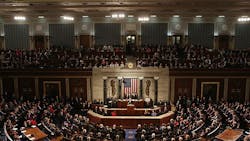In the years since it began its annual Congressional Fly-Ins in 2011, the National Association of Electrical Distributors (NAED), St. Louis, has seen awareness of its issues on Capitol Hill begin to grow but the exercise in democracy has also highlighted how much more could be done to promote electrical distributors’ interests. Now the NAED is laying the groundwork to establish a political action committee, called NAED PAC, to add more clout to its existing political advocacy work.
At the association’s Western Region Conference in Phoenix this week, Western Region vice president John Maltby of Maltby Electric told attendees that the PAC will allow NAED to go beyond its annual visits to Washington, D.C., to meet with legislators and Congressional staff and will change perceptions of NAED “from a cog to an enabler” in Washington.
The key distinction between what NAED can do with a PAC versus its political advocacy work thus far is that the PAC will “help make our advocacy more effective. It will deepen the relationships with representatives who share our priorities,” NAED Vice President for Government Affairs Ed Orlet told Electrical Marketing.
Decisions on where donations to the NAED PAC will go will be made by a new PAC board and will be focused on supporting candidates who have proven responsive to the legislative issues particularly of concern to electrical distributors, Orlet said. Key issues include preserving LIFO accounting standards and the commercial buildings tax deduction, as well as the Marketplace Fairness Act which would let states levy taxes on online retailers.
“Our issues are very niche in the bigger scheme of things,” Orlet said. “The people in Congress and their aides and staff meet with a lot of interest groups on lots of issues all day long. In a way, their world is like an endless game of whack-a-mole, and the goal is you’ve got to raise the perceived threat in their mind around whacking your mole. We try to build relationships with our members’ representatives who are watching out for us.”
Orlet said while Congress has lately been poisoned by partisanship and gridlock it’s still possible to find common ground, even across party lines. “There’s actually a great deal of pragmatism on stuff that’s not a headline issue.”
The overall electrical distributor community tends toward the conservative end of the political spectrum, but Orlet doesn’t expect the PAC to get tangled up in social issues. He also expects the PAC to avoid making contributions to presidential campaigns or getting involved in primaries or contributions to political parties.
“The board will make those decisions, and it will all be public record, but these guys know it has to be an inclusive process,” Orlet said. “There’s so much good we can do with a limited agenda. Our guys are very astute, they’re tied in with their local communities and they get to know their representatives on a personal level.”
The PAC has established a 501(c)3 and is now registered with the Federal Election Commission. The next step will be to solicit nominations for the PAC governance board that will vote on policy choices and oversee finances.
The efforts begun with that first fly-in in 2011 have proven successful in achieving their primary goal, which was to raise awareness and educate members about the role they can play in the political process, Orlet said. “From the standpoint of getting people active and educating them on the issues, it has been a tremendous success,” he said.
One side benefit of having the PAC is that it allows members who donate to cut down on the deluge of solicitations that come whenever word gets out that someone is interested in political donations, Orlet added. They can just tell other fundraisers, “I already donated to my association PAC.”
